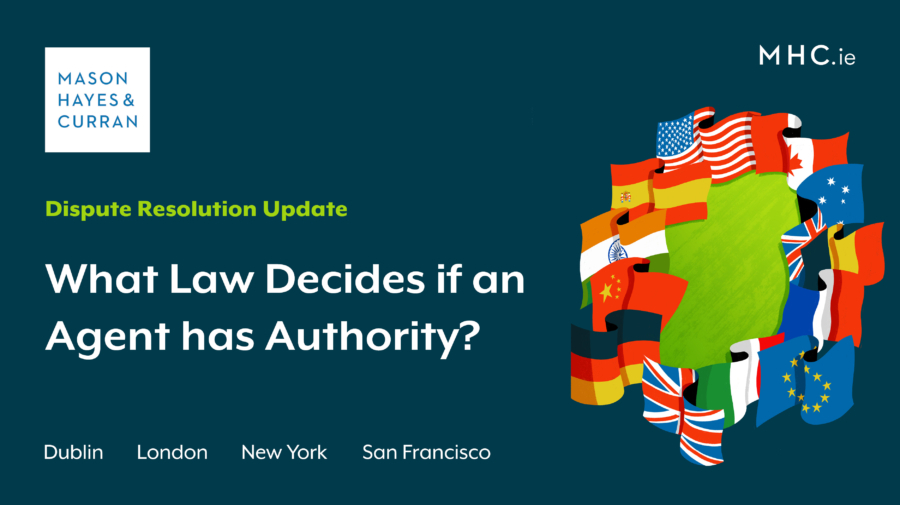What Law Decides if an Agent has Authority?

In international contract cases, an agent’s authority can sometimes be disputed. When that happens, one needs to understand which law will decide whether the agent acted with authority. Dispute Resolution partners, Gearoid Carey and Gerard Kelly review a recent Court of Appeal decision which confirmed how the Irish courts should decide which law to apply in disputes where the issue arises.
In contracts involving international parties, a claim that an agent lacked ostensible authority to enter the contract raises an immediate question about which law applies to answer that question. In a corporate context, is it the law where the relevant company is registered, or is it the law the parties have chosen to apply to the contract?
What is ostensible authority?
Ostensible authority, also known as apparent authority, is a legal concept that applies when someone appears to have the authority to act on behalf of another, even if they do not actually have explicit authority to do so. It reflects the principle that if a third party would reasonably believe in all the circumstances that an individual has the authority to act on behalf of a company, then the company may be bound by the actions of that individual. Different countries apply the principle differently, so the law which applies to the question of whether the agent acted with ostensible authority can make a significant difference.
Which law’s ostensible authority principles should apply?
The Court of Appeal has recently confirmed how Irish law determines the question as to which country’s law applies in international cases where ostensible is disputed.[1] Following the decision, it is now clear that Irish law will proceed on the basis that the law applicable to the legal question of whether an agent is acting with ostensible authority is the law of the relevant agreement(s). This will give certainty to parties involved in international agreements where an issue arises as to which law should govern any dispute regarding ostensible authority.
Background and decision
The underlying dispute related to a contract debt owed by the first defendant, guaranteed by the second defendant. The defendant appellants, both Saudi Arabian entities, claimed that the persons who signed the relevant agreements were not authorised to sign them. Consequently, it was claimed that the agreements were null and void. In addition, they claimed the contractual arrangements were with a different Saudi Arabian entity. In contrast, the plaintiff asserted that even if the signatories did not have actual authority, they had ostensible authority to sign on behalf of the defendant appellants.
In the absence of relevant Irish case law, the parties adopted contrary positions about the law which should determine any dispute regarding ostensible authority in international cases. In the High Court, Mr Justice Barniville held that if ostensible authority was disputed in such cases, it was the law of the contract which should apply to determine that dispute. Since each of the relevant agreements here contained an express provision in favour of Irish law, Irish law should apply to any dispute regarding ostensible authority. The Court of Appeal noted that conflicts of laws rules are required to give international commerce predictability. In that context, and having considered relevant authorities and academic commentary, the Court of Appeal accepted there was no perfect formula. It concluded that, although using the law of the contract was open to objections, it had “much to recommend it” because:
- It recognised the importance of a contracting party being able to assume that everything regarding the authority of an agent was covered under the law applicable to the contract made by the agent
- It provided the certainty and uniformity desirable in private international law regarding the law which applies to ostensible authority
- It was already well established in English jurisprudence, and had withstood the test of time, a direct challenge and academic criticism
- It recognised the express choice of law of the parties in the contractual documents, and
- No logic, precedent or academic commentary supported the alternative argument that the law where those parties were incorporated should apply to ostensible authority
Although the High Court suggested that an exception could be made if (i) the law of the contract resulted in an unfair outcome or (ii) some other good reason existed for not applying it, the Court of Appeal felt that this approach might cause uncertainty. As the specific issue did not need to be determined as part of the appeal, the Court of Appeal left it over for determination in a subsequent, appropriate case.
Conclusion
This decision is important because it confirms that in international cases Irish courts should apply the law of the contract where there is a dispute about the ostensible authority of an agent. In other words, the law applicable to the country of incorporation of the parties where ostensible authority is contested does not apply. Although there may be scope for exceptions to be recognised in appropriate cases in future, for now the approach to the applicable law regarding such questions is straightforward. Where ostensible authority is disputed, parties simply need to be aware that the law of the contract applies.
For more information and expert advice on commercial disputes of any nature, including disputes regarding the authority of contracting parties, contact a member of our Commercial Disputes team.
The content of this article is provided for information purposes only and does not constitute legal or other advice.
[1] Microsoft Ireland Operations Ltd v Arabic Computer Systems & National Technology Group [2023] IECA 225
Share this:




